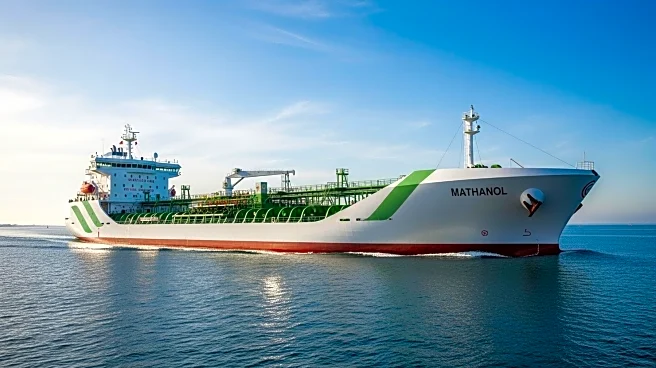What's Happening?
Fratelli Cosulich Group has launched the Maya Cosulich, the world's first methanol-powered IMO II chemical bunker tanker, at Taizhou Maple Leaf Shipyard. The launch ceremony was attended by Ms. Hoe Sook Mei from the Fratelli Cosulich Singapore office, who served as the Godmother of the vessel. Designed by SeaTech Solutions International Pte Ltd, the tanker features diesel-electric propulsion, onboard battery storage, and two mass flow meters. It complies with the Maritime and Port Authority of Singapore's methanol bunkering standards, aiming to enhance the safe and efficient delivery of alternative marine fuels. The Maya Cosulich is expected to arrive in Singapore by the end of 2025 and will operate under a time charter with TFG Marine, marking its debut as the first methanol dual-fuel bunker tanker in the Port of Singapore.
Why It's Important?
The launch of the Maya Cosulich represents a significant advancement in maritime fuel technology, highlighting the industry's shift towards sustainable energy solutions. Methanol as a marine fuel offers a cleaner alternative to traditional fuels, reducing emissions and aligning with global environmental goals. This development is crucial for the maritime industry, which faces increasing pressure to reduce its carbon footprint. The collaboration between Fratelli Cosulich Group, TFG Marine, and the Maritime and Port Authority of Singapore underscores the importance of partnerships in driving innovation and setting new industry standards. The successful operation of the Maya Cosulich could pave the way for broader adoption of methanol-powered vessels, influencing future regulatory frameworks and market dynamics.
What's Next?
Upon its arrival in Singapore, the Maya Cosulich will begin operations, potentially influencing the adoption of methanol bunkering standards globally. Stakeholders in the maritime industry may closely monitor its performance, assessing the feasibility and benefits of methanol as a primary fuel source. The success of this initiative could encourage other companies to invest in similar technologies, accelerating the transition to greener maritime operations. Additionally, regulatory bodies might consider revising existing standards to accommodate and promote the use of alternative fuels, fostering a more sustainable maritime ecosystem.
Beyond the Headlines
The introduction of methanol-powered vessels like the Maya Cosulich could have long-term implications for the maritime industry, including shifts in fuel supply chains and infrastructure development. As methanol becomes more prevalent, ports may need to adapt their facilities to support bunkering operations, potentially leading to increased investment in port infrastructure. This transition also raises ethical considerations regarding the environmental impact of shipping and the industry's responsibility to mitigate climate change. The success of methanol-powered vessels could serve as a catalyst for broader environmental initiatives within the maritime sector.










